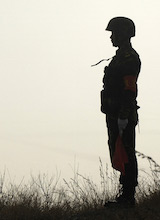Doug Delilo - Profiles of Program Completions
Doug Delilo had been a police officer for 12 years when the attacks on the World Trade Center happened. As soon as he realized what had happened, he hitchhiked to his precinct to help. He was sent to the site the day after 9/11 and worked there almost every day for three months, 15 hours a day.

“Even the first day, I saw people that were covered in stuff. I didn’t do much digging because the police didn’t necessarily do that. We were responsible for monitoring people trying to enter the site and things like that. It was crazy. We would be in the middle of all these different buildings that were being either torn down or dug through.
I had double vision for 15 months. It started in 2003. My breathing started to get really bad. I had a lot of bronchitis. They had no idea what I had. They kept sending me to different neurologists. I also went to a neuro-ophthalmologist, Dr. Kupersmith. I guess he’s famous in New York. He really didn’t know what I had. First, he diagnosed me with MS. Then, he diagnosed me with myasthenia gravis. After that, they diagnosed me with Guillian-Barre syndrome.
You could die from MS. Eventually, you die from myasthenia gravis. Guillian-Barre paralyzes you. Up until the time that I went to the program, I basically thought I was a goner.
The doctors weren’t helping me at all. Basically, they kept telling me “it’s going to go away.” That’s what they told me. It’ll go away.
I heard someone high up in the military say something interesting about PTSD. He said, “I think it’s normal that when guys come back things like the horror of 9/11 that they feel bad about it, because they’ve been put in an abnormal situation.” He said it’s normal to feel upset about these things because they’re upsetting things. I think that it’s part of life to have emotion, and these were rough things. For you to have emotions doesn’t have to mean something’s wrong.
I couldn’t even walk when I went to start the program. My eyes were looking at 2 different walls at the same time. That was really bad.
I was in the program for, I think, 31 days. I don’t really know how it works but while I was doing the program, I kept getting toxins coming out of my eyes. One day, I got a thing out of my eye that was almost like a piece of spaghetti. It was about 4 inches long. I was wiping my eye and it just started coming out of my eye all in one piece. I was like, “Oh, my God.”
It was crazy. I had stuff coming out of my skin, turning the towels different colors and things.I got my balance back after about 2 weeks. My eyes got a lot better after another 2 weeks. My breathing was better. By the time I left, I felt great. My eyes were 100 times better than when I started the program. My breathing was better. The program was amazing for me. I ended up getting eye surgery after 15 months, but the program helped me so much.
I think the program should be available for anybody that gets exposure, especially people who are in any kind of civil service job. I know that one of the first agencies that really recognized the program was the sanitation department because those guys were really exposed at the dump site.
A lot of the guys I worked with have cancer now. One died 2 weeks ago. I think that the research things are good, and I always do the survey. But I don’t think they do nearly enough preventive things to really help. What’s a survey for? By the time they do anything with the survey, everybody’s going to be dead.”




